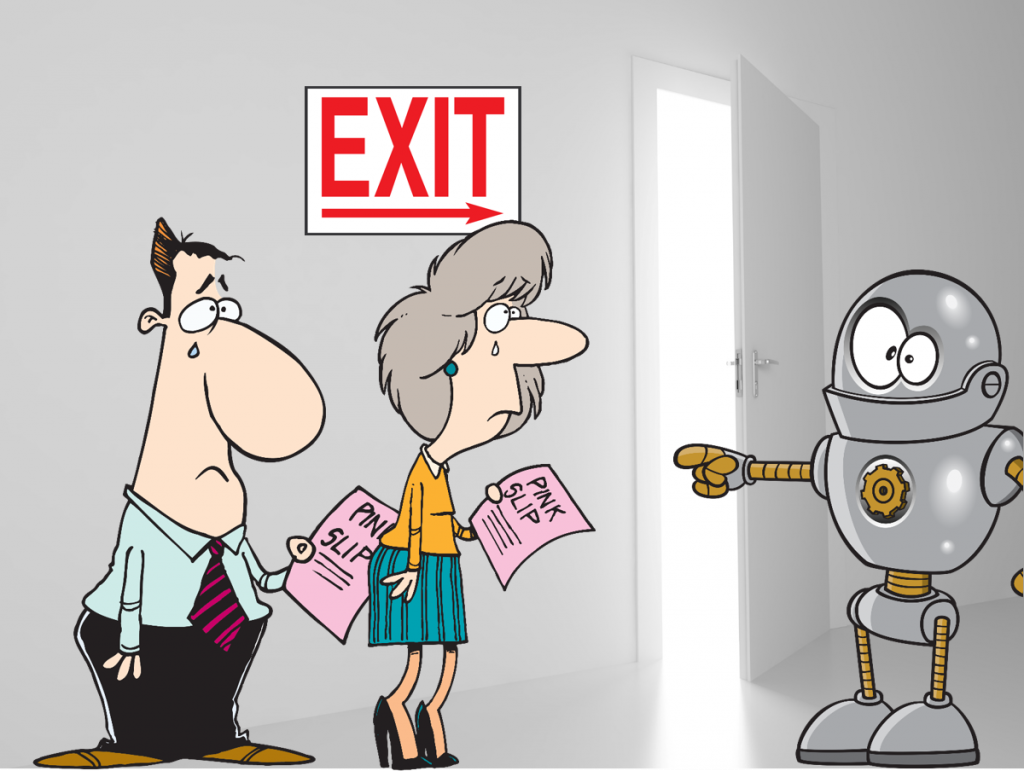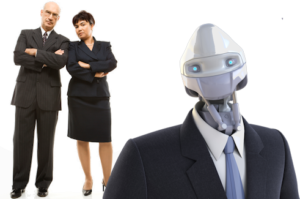There is a raging debate between pundits about how artificial intelligence (AI) will impact jobs in the future. On one side pundits are predicting AI and robotics will eliminate millions of human jobs creating economic upheaval and social unrest. On the other side, pundits are predicting AI and robotics will create new jobs and transform other jobs leading to new wealth and prosperity. The only thing both sides agree upon is that the workplace is going to change and that efforts to protect the workforce must change with it. Every stakeholder from employees to government policymakers have a role to play in molding a brighter future. We need to do our very best to avoid a future in which massive unemployment creates economic and social chaos.
The workplace of the future
“Artificial intelligence is barging its way into business,” write journalists from The Economist. “Many fret that AI could destroy jobs faster than it creates them.”[1] Just as important, they note, is the fact “AI will transform the workplace.” In the workplace of the future, they observe, both machines and humans will be equipped with sensors providing AI systems with enormous amounts of data. Depending on how this data is used, “work could become fairer — or more oppressive.” For most analysts, the biggest worry concerning changes in the workplace is how many jobs will be lost as enterprises become more digital.
Mike Volpi (@mavolpi), a General Partner at Index Ventures, writes, “There has been much speculation about the number of jobs that could be displaced by automation, but, in my view, this might not occur at the dramatic pace some are predicting. That said, there are still some important principles that should guide us as we prepare for the broader advent of AI. It will be beneficial for individuals to focus on developing professional skills for jobs that demand quintessentially human skills — jobs that require creativity and innovation, human interaction, and jobs that are technological in nature, such as software programming.”[2] Despite Volpi’s optimism, some analysts predict a future in which people are displaced by AI and robotics is much nearer than people think. Jeff Phipps (@fipzee68), managing director of ADP in the United Kingdom, observes, “Automation may seem like an issue for future generations. But our findings show that machines could replace thousands of employees in as little as five years.”[3]
Preparing now for an uncertain future
Back in 1759, Voltaire wrote, “Work saves us from three great evils: boredom, vice, and need.” Even though times and technologies have changed, his observation remains valid. Voltaire wasn’t the only wise man to note the importance of work for maintaining a strong society. Isaac Watts wrote, “Satan always finds some mischief still for idle hands to do.” Benjamin Franklin expressed the same thought when he wrote, “Idle hands are the devil’s playthings.” And Henry David Thoreau echoed those sentiments when he stated, “The devil finds work for idle hands.” Humans are quite capable of mischief without having to bring the devil into the mix. The point is, idleness gives people plenty of time to get into mischief. On the other hand, Henry Ford noted, “There is a profound difference between leisure and idleness.” The ideal future is one in which no one remains idle but, at the same time, has plenty of leisure time. In other words, people need good jobs that provide a living wage. The potential for AI and robotics to eliminate jobs is therefore problematic.
Axel Bugge (@reutersAxelB) reports, “Investors believe it is ‘inevitable’ that artificial intelligence will destroy millions of jobs and that governments are unprepared for such an impact.”[4] Andrew Ng (@AndrewYNg), founder of Coursera, formerly the head of AI for Chinese search giant Baidu and, before that, creator of Google’s deep-learning Brain project, predicts, “Artificial intelligence is coming for plenty of jobs.”[5] That is not good news. Julia Bossmann (@juliabossmann), President of Foresight Institute, believes unemployment caused by smart machines is one of the most pressing ethical questions of our time. “Most people still rely on selling their time to have enough income to sustain themselves and their families,” she writes.[6] Even if it turns out more jobs are created by AI and robotics than are eliminated, displaced workers will need to retrained and perhaps relocated. In order to foster a brighter future, we need to ensure humans have jobs to perform and economic security.
R. Edward Freeman (@RE_Freeman) and James R. Freeland, professors at the Darden School of Business at the University of Virginia, observe, “Whatever the net increase or decrease in jobs overall, what is not at issue is that these will be different jobs, requiring different skill sets.”[7] They also believe we can’t wait for these new jobs to be created before we prepare people to fill them. “We need to act now,” they write, “to enable current employers and employees to gain the skills they are going to need in the brave new world of AI technology.” They report many tech companies are reaching out to educational institutions with support to train tech savvy students. They are also retraining and reskilling their current employees. In addition, they note, many “countries are getting involved in providing resources for retraining and lifelong learning.”
Summary
Job displacements are coming. Technology has always resulted in eliminating jobs. In fact, most technologies are specifically designed to assume tasks that are either dangerous or tedious. Pessimists believe this round of technologies will eliminate more jobs than they create — and that could be a problem. As Freeman and Freeland note, “Whatever the net increase or decrease in jobs overall, what is not at issue is that these will be different jobs, requiring different skill sets.” Every stakeholder, from the employee to employer to policymakers, have a role in helping prepare current and future workers for Digital Age jobs — some of which don’t yet exist.
Footnotes
[1] Staff, “The workplace of the future,” The Economist, 28 March 2018.
[2] Mike Volpi, “How We Can Prepare For Artificial Intelligence Job Displacement,” Forbes, 28 June 2018.
[3] Felicity Hannah, “Why we need to protect our income from robot automation,” Independent, 12 May 2018.
[4] Axel Bugge, “Investors see artificial intelligence destroying millions of jobs: poll,” Reuters, 10 November 2016.
[5] Rachel Metz, “Andrew Ng Wants a New ‘New Deal’ to Combat Job Automation,” MIT Technology Review, 7 November 2017.
[6] Julia Bossmann, “Top 9 ethical issues in artificial intelligence,” World Economic Forum, 21 October 2016.
[7] Edward Freeman and James R. Freeland, “The Time for Retraining Is Now,” MIT Sloan Management Review, 6 April 2018.





